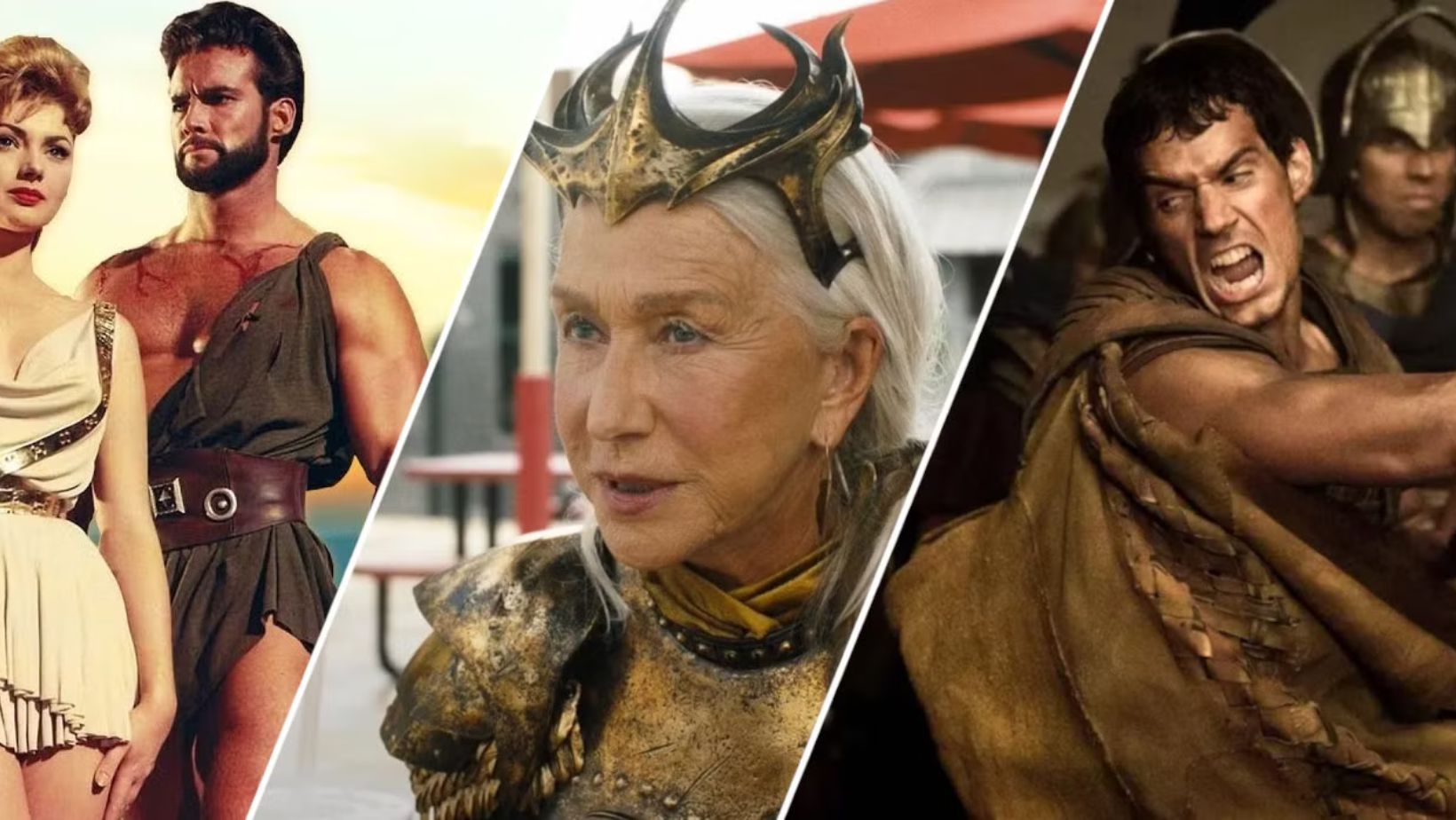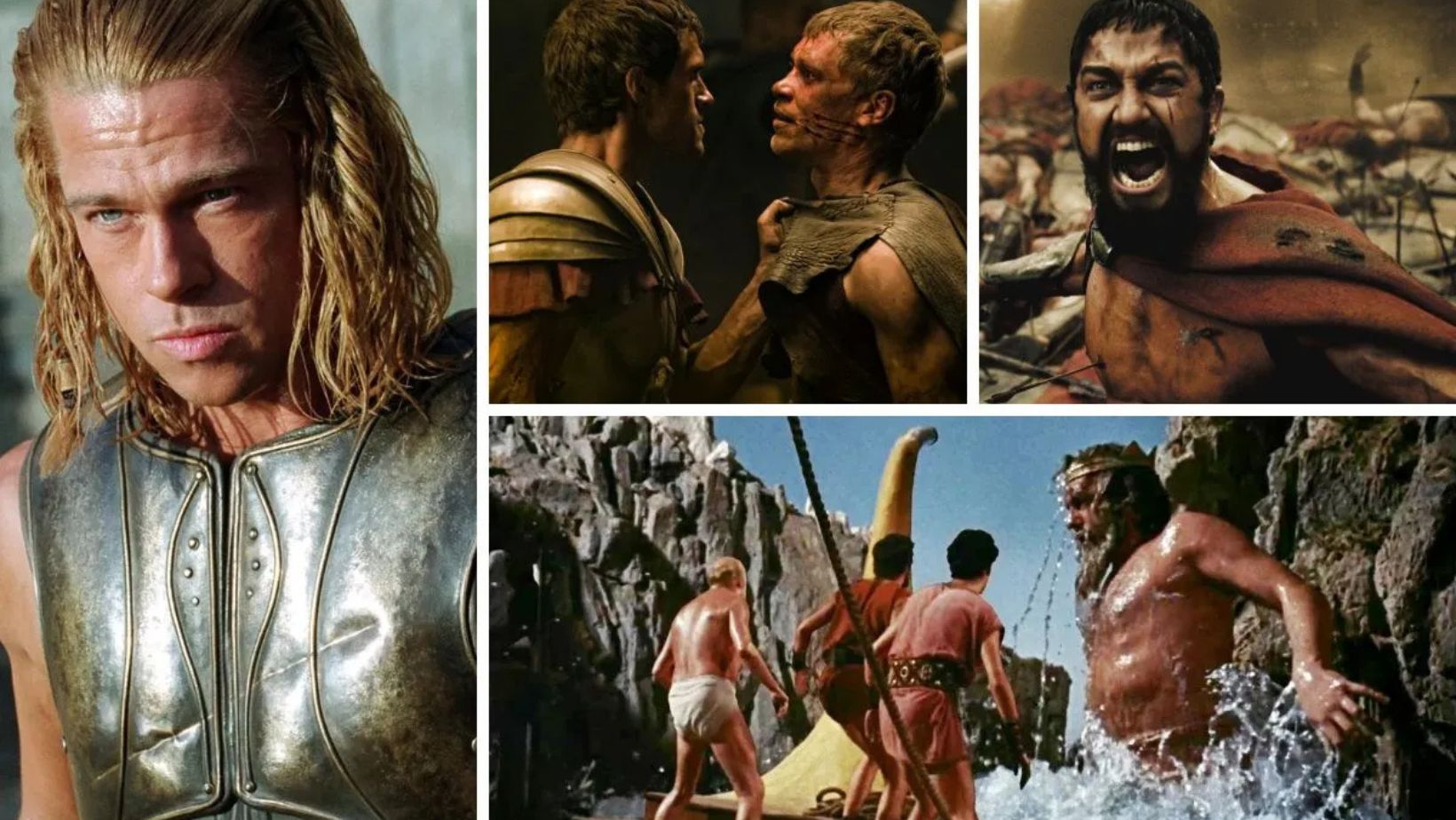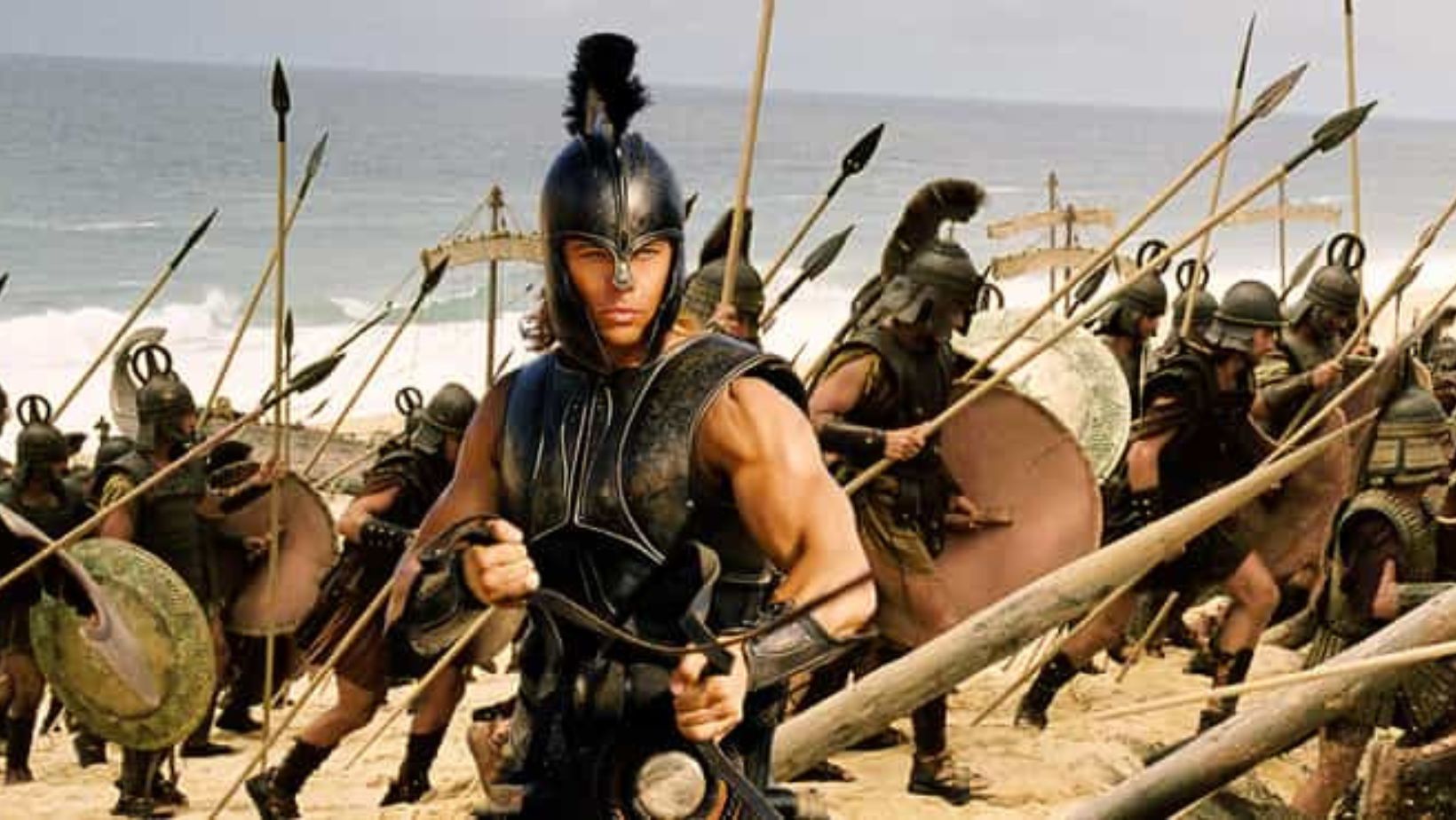Greek mythology has fascinated storytellers for centuries. These ancient tales of gods, heroes, and epic battles offer timeless themes that resonate with audiences today. From love and betrayal to courage and sacrifice, these stories capture the essence of the human experience. No wonder filmmakers are drawn to these rich narratives! The enduring popularity of Greek myths in cinema speaks to their power and relevance. Movies like Troy and Disney’s Hercules breathe new life into these classic tales, making them accessible for modern audiences. Let’s explore the best films that bring Greek mythology to the big screen.
The Classics: Iconic Films from the Golden Age

The mid-20th century saw a resurgence of interest in Greek mythology through cinema. Films like Jason and the Argonauts (1963) captivated audiences with their stunning visuals and imaginative storytelling. Directed by Don Chaffey, this film follows Jason’s quest for the Golden Fleece, featuring memorable characters and groundbreaking special effects. Its stop-motion animation, especially the scenes with the skeleton warriors, remains iconic to this day.
Another classic is Clash of the Titans (1981), directed by Desmond Davis. This film tells the story of Perseus as he battles mythical creatures to save Princess Andromeda. With its blend of adventure and romance, it became a box-office hit. The film’s impressive visual effects, including the portrayal of the Kraken, helped establish a legacy that continues to influence fantasy films. These classics paved the way for future adaptations of Greek mythology, proving the tales’ timeless appeal.
Modern Adaptations: Fresh Takes on Timeless Tales
Contemporary filmmakers have found new ways to reinterpret Greek myths for modern audiences. These adaptations often emphasize action, drama, and visual spectacle. For instance, Troy (2004), directed by Wolfgang Petersen, presents a gritty retelling of the Trojan War. It stars Brad Pitt as Achilles and explores themes of honor, love, and betrayal, providing a fresh perspective on the legendary conflict.
Similarly, 300 (2006), directed by Zack Snyder, adapts the story of the Battle of Thermopylae. This film employs a distinctive visual style, using high-contrast colors and stylized graphics to enhance the epic battles. It dramatizes the courage of Spartan warriors, led by King Leonidas, in their fight against overwhelming odds. Both films showcase how modern adaptations can breathe new life into ancient stories, making them relevant to today’s viewers. By blending historical context with contemporary cinematic techniques, filmmakers continue to explore the rich tapestry of Greek mythology in exciting ways.
Animation and Greek Mythology: Mythical Stories for All Ages
Animated films have played a significant role in popularizing Greek mythology among younger audiences. These films creatively reinterpret ancient tales, making them accessible and engaging. One notable example is Disney’s Hercules (1997). This film presents a lighthearted and comedic version of the myth of Hercules, focusing on themes of heroism and self-discovery. Its vibrant animation and memorable songs have left a lasting impression.
Another important animated adaptation is The Odyssey (1997). This film takes a more traditional approach, depicting the adventures of Odysseus as he struggles to return home after the Trojan War. It captures the essence of Homer’s epic poem while introducing the story to a new generation. Both films highlight the flexibility of Greek myths, showcasing their ability to inspire diverse storytelling formats.
By blending humor, adventure, and vibrant animation, these films create a lasting connection to ancient stories. They invite audiences of all ages to explore the rich world of Greek mythology in a fun and engaging way.
The Role of Special Effects: Bringing Myths to Life
Advancements in technology have transformed how mythological stories are portrayed in films. Special effects play a crucial role in bringing ancient tales to life, making them more visually engaging. Practical effects, such as animatronics and puppetry, were once the primary methods for creating mythical creatures. Films like Jason and the Argonauts (1963) utilized stop-motion animation to depict the skeleton warriors, showcasing the creativity of filmmakers in that era.
However, the rise of computer-generated imagery (CGI) has revolutionized the industry. Movies like Clash of the Titans (2010) and 300 (2006) leverage CGI to create stunning visuals, allowing filmmakers to depict epic battles and fantastical creatures with ease. This technology enables a more immersive experience for audiences, transporting them into the heart of Greek mythology.
The choice between practical effects and CGI often depends on the film’s vision and budget. While practical effects can provide a tangible quality, CGI offers limitless possibilities for storytelling. Together, these techniques enhance the portrayal of Greek myths, capturing the imagination of viewers and making ancient stories relevant for modern audiences.
Character Studies: Depictions of Key Figures in Greek Mythology

Films depicting Greek mythology often focus on iconic characters like Zeus, Achilles, and Odysseus. These figures embody the complexities of human nature, from heroism to hubris. Zeus, typically portrayed as a powerful yet flawed leader, represents the duality of divinity. His portrayal varies from the authoritative figure in Clash of the Titans (1981) to a more nuanced version in Immortals (2011).
Achilles, the legendary warrior of the Trojan War, is depicted as both heroic and tragic. In Troy (2004), Brad Pitt’s portrayal highlights his fierce combat skills and emotional struggles, showcasing the character’s depth. His conflict between glory and mortality resonates strongly with audiences.
Odysseus, the clever and resourceful hero of The Odyssey, is often depicted as a man driven by wit and determination. In the animated adaptation from 1997, he is presented as a relatable figure, facing challenges with intelligence. The performances of actors in these roles significantly shape how audiences perceive these legendary figures. These portrayals bring ancient characters to life, making them accessible and relevant to modern viewers.
Feminine Perspectives: Strong Women in Greek Mythology
Greek mythology features powerful female figures like Medusa, Persephone, and Atalanta, who embody strength and resilience. In Clash of the Titans (1981), Medusa is depicted not only as a monster but also as a tragic figure cursed by the gods. This portrayal adds depth to her character, showcasing her struggle and the consequences of divine wrath.
Persephone, the queen of the underworld, represents themes of duality and transformation. Her story is explored in various adaptations, highlighting her strength in navigating the complexities of life and death. This complexity makes her a compelling character in films like Hercules (1997), where her dual nature is emphasized.
Atalanta, known for her speed and hunting prowess, is another significant figure. In many adaptations, she challenges traditional gender roles, often depicted as a fierce warrior. Her character encourages empowerment, demonstrating that women can defy expectations. Films that focus on these strong female characters provide a fresh perspective on Greek mythology, emphasizing their importance in ancient stories and their relevance today.
Documentaries and Their Impact on Understanding Mythology
Documentaries provide an insightful lens into Greek mythology, exploring its origins and cultural significance. Films like The Greeks: Crucible of Civilization delve into how mythology shaped ancient Greek society. This documentary connects historical events with mythological narratives, illustrating their influence on politics, art, and daily life.
Another notable documentary, In Search of Myths and Heroes, takes viewers on a journey through various myths. It examines how these stories reflect human experiences and societal values. By analyzing characters and themes, this film reveals the universal truths embedded in ancient tales.
These documentaries enhance our understanding of Greek mythology beyond entertainment. They showcase the context in which these myths were created and their relevance today. Through expert interviews and historical analysis, viewers gain a deeper appreciation for the narratives that have endured for centuries. This educational approach fosters a greater connection to the myths, allowing modern audiences to grasp their enduring impact on culture and storytelling.
Cinematic Techniques: The Art of Storytelling in Mythological Films
Cinematic techniques play a crucial role in bringing mythological stories to life. Effective cinematography captures the grandeur and epic nature of myths. Wide shots of landscapes and battle scenes immerse viewers in ancient worlds. Close-ups on characters convey their emotions, adding depth to the storytelling.
Sound design is another essential element in mythological films. A powerful score can evoke emotions and enhance the atmosphere. For example, the music may swell during climactic battles or soften during poignant moments. Sound effects, like thunder or the clash of swords, make scenes more immersive.
Narrative structure is vital for pacing and engagement. Many mythological films follow a hero’s journey, providing a familiar framework for audiences. This structure allows viewers to connect with characters and their struggles. Flashbacks and nonlinear storytelling can also add layers to the narrative, enriching the mythological experience.
Together, these cinematic techniques create an engaging atmosphere for viewers. They transform ancient tales into visually stunning experiences that resonate with modern audiences. By skillfully combining these elements, filmmakers can transport viewers into the heart of Greek mythology.
The Legacy of Greek Mythology in Modern Cinema

Greek mythology has a profound influence on modern storytelling and popular culture. Its themes of heroism, tragedy, and morality resonate with audiences today. These timeless narratives offer rich material for filmmakers to explore complex characters and situations. As a result, ancient myths continue to inspire contemporary cinema.
Recent films and series draw heavily from these myths. For instance, “Percy Jackson & the Olympians” brings Greek mythology to a younger audience, blending adventure with ancient tales. Similarly, Netflix’s “Blood of Zeus” offers a fresh animated take on the myth of Heron, highlighting gods and monsters in a modern format. These adaptations showcase how filmmakers reinterpret classic stories for new generations.
Moreover, Greek mythology influences genres beyond fantasy. Elements of mythological storytelling appear in action films, dramas, and even comedies. Themes such as fate, power, and the struggle between good and evil remain relevant today. This legacy ensures that Greek mythology will continue to captivate audiences, shaping narratives in modern cinema for years to come.
Conclusion: Depicting Greek Mythology
Greek mythology remains a powerful source of inspiration in film, offering epic narratives and timeless themes. From classic films to modern adaptations, these stories continue to captivate audiences worldwide. We explored how filmmakers utilize technology, character development, and strong female figures to bring these ancient tales to life. As you dive into these cinematic interpretations, you’ll discover the richness and depth of Greek mythology. Whether through animation, live-action, or documentaries, there’s much to appreciate. So grab some popcorn and embark on a journey through the captivating world of Greek myths on screen!
FAQs
What are the themes commonly found in films depicting Greek mythology?
Films depicting Greek mythology often explore themes of heroism, fate, love, and the struggle between good and evil. These narratives frequently highlight the complexity of human emotions and the consequences of divine intervention.
How has the portrayal of Greek mythology in films changed over time?
Earlier films focused more on traditional interpretations of myths, often emphasizing spectacle and grandeur. Modern adaptations tend to include character-driven narratives and updated themes, making these ancient stories more relatable to contemporary audiences.
Are there any films based on lesser-known Greek myths?
Yes, there are films that delve into lesser-known myths, exploring characters like Psyche and Orpheus. These stories provide a different perspective on Greek mythology and highlight the rich tapestry of narratives that exist beyond the more popular tales.
What role do adaptations of Greek myths play in education?
Adaptations can serve as engaging tools for introducing Greek mythology in educational settings. They can spark interest in the original texts and encourage discussions about themes, character motivations, and historical context.
Can you recommend any recent TV series inspired by Greek mythology?
Yes, recent TV series such as “Blood of Zeus” and “The Chosen” explore Greek myths and their characters, offering fresh takes and modern storytelling techniques. These series further illustrate the enduring appeal of these ancient tales in contemporary media.

